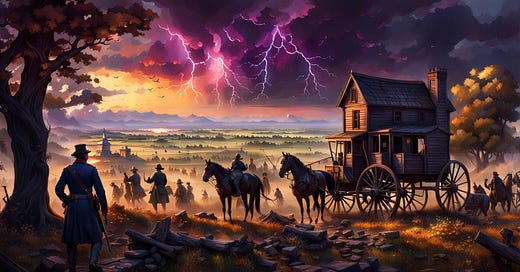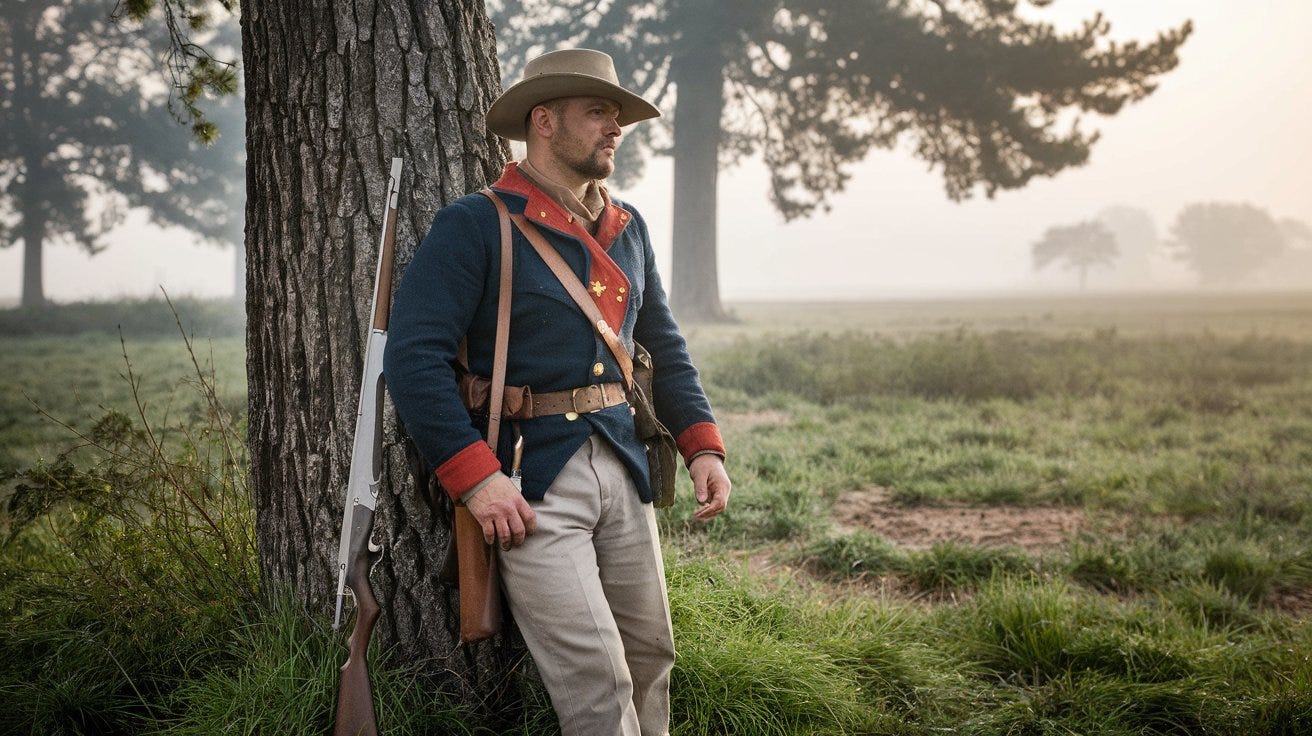Dear Poetry Enthusiasts,
Today we're exploring a fascinating intersection of historical perspectives through three poems I have written in the distinctive styles of contemporary masters. Each poem captures a single day in the life of a warrior, yet from three radically different vantage points of American history. Through these varied lenses, we see how personal experience meshes with massive historical movements. These poems are simple in style, yet chilling in their content!
Today we will publish the first of three very different poems, yet they are similar in their origin - the voices of war, from those who experienced it first hand.
The Poems and Their Voices
"Daybreak to Dusk, 1863" (in the style of Natasha Trethewey)
Trethewey, a former U.S. Poet Laureate and Pulitzer Prize winner, is known for her unflinching examination of Civil War history and its implications for American racial identity. Her work often weaves personal narrative with historical detail, creating a tapestry that reveals larger truths through intimate moments.
In our Confederate soldier's poem, we see Trethewey's characteristic attention to material detail – the "wool uniform, gray as morning fog," the "daguerreotype" with its tarnishing edges. The poem employs her technique of using concrete objects to carry metaphorical weight: the captain's maps become "like a preacher with his Bible," and ammunition is counted "like rosary beads." This religious imagery, another Trethewey hallmark, underscores the spiritual crisis inherent in civil conflict.
"A Day's Circle" (in the style of Joy Harjo)
Harjo, the first Native American U.S. Poet Laureate, brings a unique perspective to historical poetry through her understanding of time as circular rather than linear. Her work often emphasizes the simultaneity of past, present, and future in Indigenous experience.
Our Sioux brave's day unfolds in Harjo's characteristic spiral of time, where "I am all these moments at once." The poem embraces her frequent themes of ancestral connection ("my grandfather's ghost rides"), spiritual communication with nature ("the sun speaks in the old language"), and the integration of ceremonial practice with daily life. Her influence shows in the poem's treatment of ordinary experiences as sacred and the emphasis on collective rather than individual identity.
"Orders and Omens" (in the style of Simon Armitage)
Armitage, the current UK Poet Laureate, is renowned for his ability to bring historical moments into sharp contemporary focus through colloquial language and precise cultural detail. His work often examines the intersection of personal experience with larger historical forces.
In our British officer's poem, we see Armitage's characteristic ironic distance ("they still think this is a game / of soldiers") and his attention to class markers ("Hampshire's genteel dark"). The poem employs his technique of mixing high and low diction, and his talent for finding the universal in the specific – here, through the officer's thoughts of "cricket matches, / village greens, warm beer."
The Connection
These three poems, while separated by perspective and allegiance, share a common thread: they capture moments when individual lives intersect with massive historical change. Each speaker stands at a different angle to American history – the Confederate soldier in its deepest internal conflict, the Sioux brave facing cultural devastation, and the British officer witnessing the birth of a new nation.
What unites them is their humanity in the face of historical forces beyond their control. Each speaker maintains personal connections (the soldier's Sarah, the brave's grandfather, the officer's Mary) while navigating their role in history's grand narrative. Through these intimate portraits, we see how historical events were experienced not as history, but as present moments filled with uncertainty, fear, and hope.
Looking Forward
These poems remind us that history is not merely a sequence of events, but a complex web of personal experiences, each worthy of examination and understanding. Through the varied styles of three master poets, we gain different ways of seeing and understanding these crucial moments in American history.
Here is the first of the three poems:
Daybreak to Dusk, 1863
(After Natasha Trethewey)
At dawn, the dew settles like fear
on my wool uniform, gray as morning fog
lifting from the Rappahannock. Mother's
careful stitching holds despite the mud,
despite three months of marching.
My rifle—clean as scripture—leans
against a cedar. Hardtack crumbles
in my pocket, tasteless as the letters
I cannot write home. What would I say?
That yesterday I saw Tom Parker fall,
his Georgian drawl cut short by Yankee lead,
or how the coffee beans have run dry,
leaving us to roast chicory root
in the embers of last night's fire?
The captain paces, consulting his maps
like a preacher with his Bible, searching
for salvation in the contour lines.
We all know what's coming: another push
north, another day of counting ammunition
like rosary beads, of watching the sun
arc across an indifferent sky.
In my haversack, a daguerreotype—
Sarah in her Sunday best, hair swept up
like Spanish moss on live oak. The silver
tarnishing at the edges, like my memory
of home. Three fields away, a Union patrol
moves through the wheat. We wait,
as soldiers do, for orders or death,
whichever comes first.
Night falls like judgment. We dig in,
scraping trenches in Virginia clay,
each shovelful a prayer for morning.
In darkness, both sides' campfires
mirror stars—points of light
that guide no one home.
Natasha Trethewey (b. 1966) - A former U.S. Poet Laureate, she frequently writes about American Civil War history and racial identity. Her collection "Native Guard" won the 2007 Pulitzer Prize for its powerful exploration of a Black Union regiment during the Civil War.






